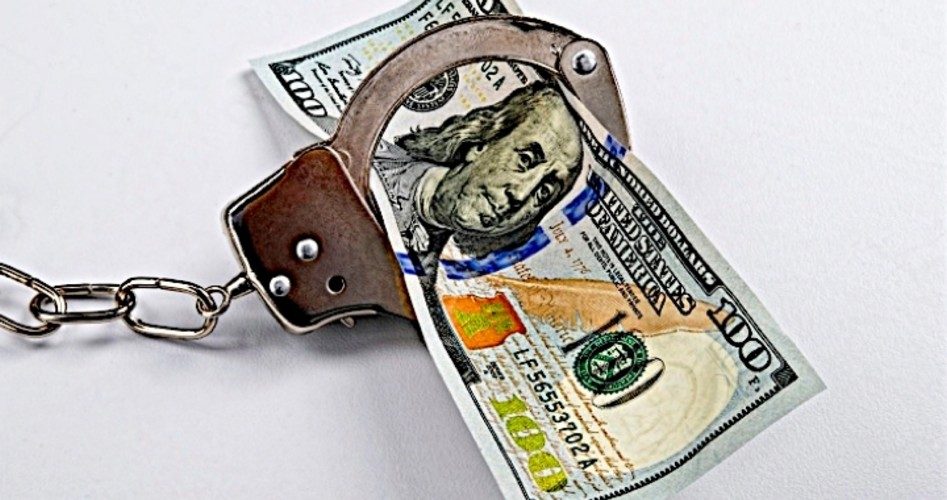
William Cicco of Broken Arrow, Oklahoma, was arrested in March 2013 for driving under the influence — he had taken a prescription painkiller medication to treat his cancer — when police discovered a paper bag in his car full of over $15,000 in cash.
That was enough for the police to assume it was drug profits, seizing it under what is known as “civil asset forfeiture” (CAF). Under CAF, a person does not have to be convicted of any crime before law enforcement can take his or her property. CAF is used by federal, state, and local law enforcement officers to seize property they merely assert has been used in wrongdoing — without having to actually charge a person with wrongdoing.
CAF is an assault upon the very concept of private property and the legal position that an accused person is presumed innocent until found guilty beyond a reasonable doubt.
Certainly an American citizen should be able to drive down the road with large amounts of cash; however, law enforcement officials engaged in the War on Drugs argue that this is a tip-off that the person is a drug dealer.
Maybe. Maybe not. However, guilt is for a jury to decide, not a law enforcement official.
But now, the state of Oklahoma is prepared to go beyond presuming that a person in possession of large amounts of cash is up to no good, by extending CAF seizures to debit cards.
An increasing number of Americans are using prepaid debit cards to transact even small purchases, choosing not to carry around large amounts of cash, which could be stolen or lost. They prefer to use these cards, rather than own a checking account. It is estimated that around 12 million people use prepaid debit cards on a regular basis. They tend to be younger, and earn less than $25,000 per year. And a larger number of renters, single people, and blacks use these cards than the average older, wealthier, home-owning, married, whites. In other words, the demographic that tends to use these cards is those who are considered by law enforcement as more likely to be involved in drug dealing than 70-year-old married homeowners.
So, to deal with this group, the Oklahoma Department of Public Safety (DPS) is paying a Texas firm, ERAD group, for 16 prepaid card readers, as well as implementation and training. These devices work on “open loop” prepaid debit cards, such as those offered by Visa or American Express. They do not work on debit cards tied to a checking account or on credit cards.
The ERAD group will also be paid a “processing fee” of 7.7 percent from all money seized using the readers. Presently, police and prosecutors often keep all the cash they seize.
What is this cash used for? According to the Institute for Justice, which is opposed to CAF laws, 70 percent of all forfeiture money in Oklahoma is used to fund salaries for law enforcement.
But Oklahoma did not originate this idea of seizing money on a debit card. Not surprisingly, it was the federal Department of Homeland Security that first asserted that drug dealers were using prepaid cards as an alternative to cash. ERAD argued that even with probable cause, there was no method of determining the value of the card, freezing the funds, or seizing the money at the point of arrest. Before ERAD-Prepaid (a trademarked name) the process would take days, weeks, or even months. But with ERAD, the process is almost instantaneous.
The money can be drained off the card by law enforcement at the time of arrest, similar to the present practice of seizing cash. Presently, cash is sometimes seized even when no arrest is made.
Another way in which the federal government is supporting state law enforcement in their use of CAF is through what is called the “equitable sharing” program of the U.S. Department of Justice. Under this program, local law-enforcement agencies join with federal agencies to seize assets under federal law, with the local agencies keeping the lion’s share of the proceeds.
This program has grown from $94 million in 1986 to $4.5 billion in 2014. Not only does this give law enforcement a huge profit incentive to seize assets, but it also provides a way for local and state law enforcement to circumvent any reforms of civil asset forfeiture enacted by the state legislature. By using the “adoptive forfeiture” feature of the law, local and state law enforcement can avoid the higher burden of proof (beyond a reasonable doubt) and various other restrictions some state legislatures have been enacting. Even simple possession of marijuana, a federal crime, can lead to assets being forfeited to the feds.
Senator Rand Paul (R-Ky.) has introduced legislation to abolish the equitable sharing program; however, law enforcement interests have persuaded Congress to kill Paul’s efforts.
CAF creates a situation wherein state governments have lost some control over their own law-enforcement agencies. “Power of the purse” has always been a potent tool of legislative bodies to restrict the power of the executive, or law-enforcing, branch of government. Even if state governments require that any seized assets go to the general treasury of the state, or a state program other than law enforcement, equitable sharing instead puts the state’s share of seized assets in the hands of law enforcement. By having seized assets go directly into the coffers of those who seize the assets, a perverse incentive is thus created for seizures to take place.
The CAF program was sold in the 1980s as way to combat major drug traffickers and cartels, but it is now commonly employed against average Americans. In the above mentioned-case of William Cicco of Broken Arrow, Oklahoma, he was forced to spend $3,000 on a lawyer and a bond to get his money back. He also had to pay an impound fee to get his car back after the Bixby, Oklahoma, police impounded it. As they prepared to impound his car, they found medicines that were all used for treatment of Cicco’s lymphoma.
That led to the justification for seizing the $15,500 in cash.
Despite multiple stories such as Cicco’s, most prosecutors continue to defend CAF, and have no problem with the notion of seizing a person’s assets without first proving that person guilty of something. Chris Ross, a district attorney in Oklahoma, even wrote in an op-ed, “The proposal that a conviction is necessary before forfeiture is granted is an ill-conceived notion that ignores the reality of the narcotics trade.” He dismissed efforts at reform as “drug dealer’s profit protection.”
The supporters of CAF argue that the drug problem is so severe that law enforcement simply must have the “tools” to combat the drug kingpins. But it is unfair to charge those who wish to rein in the abuses of CAF as favoring criminals, just as it would be unfair to charge those who argue for due process for accused murderers as supporting homicide.
One provision of the English Bill of Rights, adopted following the Glorious Revolution, addresses this very issue: “Forfeitures before conviction are void.”
The late Congressman Henry Hyde contended that CAF is also a violation of the Eighth Amendment, which prohibits “excessive fines.” He wrote, “There is little or no proportionality between the crimes alleged and the punishment imposed” in most cases, citing examples of entire hotels being taken from the owners simply because gangs used a room for drug transactions.
Of course, if the Constitution is not important to those favoring CAF, perhaps the Seventh Commandment, “Thou shalt not steal,” should make some difference.
Before, carrying large amounts of cash was enough for far too many in law enforcement to presume you are involved in drug dealing. Now, the technology exists to suck your money off a pre-paid debit card. One must ask, What is the next avenue for government, at all levels, to violate your property rights?
While it is up to each state to decide what to do about its own CAF laws, Congress can take action to severely cripple the role the federal government plays in this travesty. They can defund the program. This would greatly restrict the “equitable sharing” program, even if the Obama administration desired to continue it.
Steve Byas is a professor of history at Randall University (formerly Hillsdale Free Will Baptist College). His book History’s Greatest Libels is a challenge to many of the falsehoods against such personalities in history as George Washington, Joseph McCarthy, and Marie Antoinette. He has also written two mystery novels, Digging Up Bones, and Sooner Dead.



